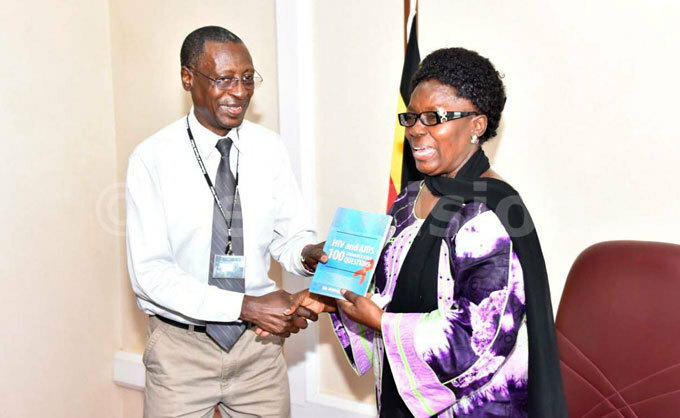People living with HIV meet Speaker of Parliament
May 12, 2017
“It is really annoying. I will cause a meeting between Ministry of Health and Ministry of Finance for clear timelines. Since it is the budget period, I will ensure that deadlines to expedite AIDS Trust Fund are established,” she pledged.

The Speaker of Parliament, Rebecca Kadaga, is shocked that four years since H.E the President assented to the HIV and AIDS Prevention and Control ACT, Ministry of Health has not released guidelines for the AIDS Trust Fund.
"It is really annoying. I will cause a meeting between Ministry of Health and Ministry of Finance for clear timelines. Since it is the budget period, I will ensure that deadlines to expedite AIDS Trust Fund are established," she pledged.
The purpose of the AIDS Trust Fund is to mobilize additional resources for funding the HIV counseling, testing and treatment as part of the national HIV and AIDS response.
 Dr. Watiti Stephen presenting the books he wrote about HIV to Rt. Hon. Rebecca Kadaga the Speaker of Parliament.
Dr. Watiti Stephen presenting the books he wrote about HIV to Rt. Hon. Rebecca Kadaga the Speaker of Parliament.
Kadaga was on Wednesday addressing People living with HIV under their Umbrella organization, the National Forum of People Living with HIV & AIDS Networks in Uganda (NAFOPHANU) who had paid her a courtesy call in her office.
She also decried the injustices and domestic violence against women and called for joint effort by all women rights organizations, women in leadership positions and other stakeholders.
The Executive Director of NAFOPHANU, Stella Kentutsi, informed Kadaga that the meeting was aimed at sharing the contribution of people living with HIV & AIDS, discuss gaps in HIV service delivery and jointly forge a way forward.
Kentutsi shared a brief of the HIV context in Uganda highlighting that the country has about 1.5 people living with HIV and of these 176,948 are children. She said that HIV is predominantly higher in women (8.3%) than in men 6.1%.
She regretted that three percent of adolescent girls aged 15 - 19 years live with HIV and the prevalence doubles by the time they are 24 years. The HIV prevalence rates stand at 7.3% but with variations between regions.
She informed Kadaga that according to the HIV/AIDS Country Progress Report, people living with HIV on Treatment (2015): 874,124, AIDs related deaths (2015): 28,000, new HIV infections (2015): 83,000. Also 28,000 people die of HIV/AIDS related death every year.
"The key drivers of the epidemic in Uganda include sub optimal scale up of ART, gender inequalities including gender based violence, high risk sexual behaviors, multiple sexual partners, inconsistent condom use, transactional sex, low individual level risk perception, limited male involvement in the response among others yet funding for the response has largely remained external," she said.
Kadaga pledged to mobilize Members of Parliament to reach out to their constituencies on HIV issues.
She committed to ensure that a standing committee on HIV and related diseases is constituted to spear head constituency out reaches. She noted however that more advocacy and financing to this effect is required.
She pledged to urge relevant authorities to increase the health budget noting that it is unfortunate that the health budget was reduced but members of Parliament will be mobilized to support its upward movement.
The key issues people living with HIV asked the Speaker to consider include;
1. Supply chain management gaps that have led to sporadic stock outs of HIV, TB, medicines, supplies and commodities such as condoms, test kits and laboratory reagents.
2. Financing: need to increase domestic funding for HIV and operationalization of the AIDS Trust Fund.
3. Stigma and Discrimination that hamper access to utilization of available services.
4. Enhancing community mobilization and sensitization to bridge knowledge gaps on HIV & AIDS.
5. Investing in HIV related research.
6. Gender Based Violence towards women and girls.
7. Commodity security and eliminating stock outs of HIV and TB medicines, other supplies such as condoms, test kits and laboratory reagents. Ordering and supply has to be timely and consistent to ensure adherence and limit drug resistance
8. Ensure budget increment for HIV co-morbidities and commodities, Ministry of Health projects $120 M (2016/2017), $147M (2017/2018), 178M (2018/2019).
9. Increased remuneration for health workers as well as their housing to keep them at facilities
10. Monitor budget allocations to ensure proper fund utilization as approved and released.
11. Expediting the AIDS Trust Fund operationalization.
12. Encourage Members of Parliament to carryout community mobilization and HIV sensitization during their constituency engagements
13. Recognition of the roles of community resource persons such as expert clients and counselors in government health care systems.
